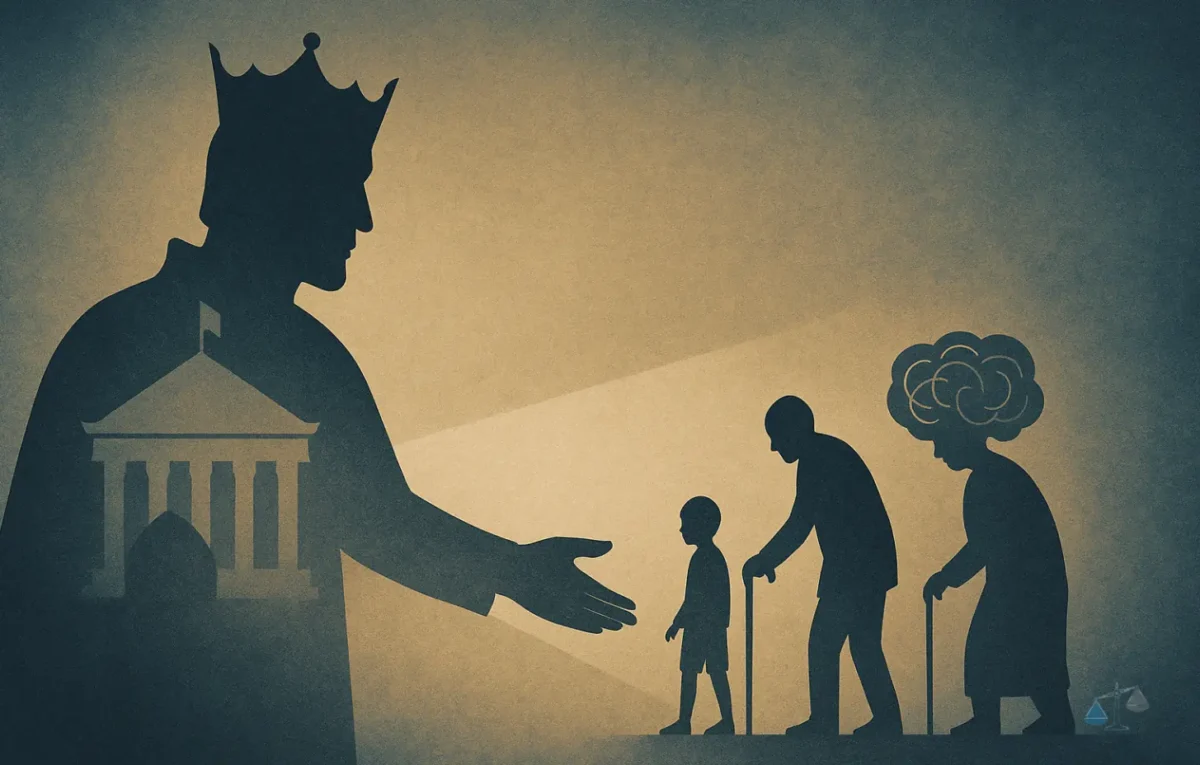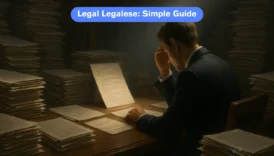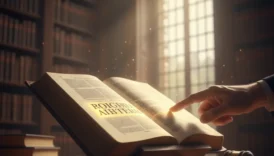What is Parens Patriae? Understanding the State’s Role as Guardian

In the vast lexicon of legal terminology, few phrases carry the historical weight and modern-day relevance of Parens Patriae. A Latin term meaning “parent of the nation,” this doctrine establishes the inherent power and responsibility of the state to act as a guardian for those who are unable to care for themselves. It is the legal foundation that allows courts and public agencies to intervene in the lives of vulnerable individuals—such as children, the mentally incapacitated, or the elderly—to protect their well-being and best interests.
But what does this doctrine truly mean in practice, and how does it shape the relationship between the citizen and the state? This article will provide a clear Parens Patriae definition, explore its historical origins, examine its contemporary applications, and discuss the critical limitations that balance state power with individual rights.
Parens Patriae Definition: The Legal Meaning of the Doctrine
At its core, the Parens Patriae doctrine is the principle that the state (specifically, the sovereign) holds a protective, parental-like power over its citizens who are non sui juris (legally unable to act on their own behalf). This is not the power of a tyrant, but rather a fiduciary duty—a responsibility to act solely for the benefit of the person in need of protection.
The logic behind the doctrine rests on three fundamental pillars:
- A Vulnerable Population: Society includes individuals who lack the capacity to protect their own interests or make sound decisions for themselves.
- The State’s Responsibility: The state has a fundamental obligation to ensure the welfare of all its citizens, with a special duty of care towards its most vulnerable members.
- The Power to Intervene: To fulfill this duty, the state is granted the legal authority to step in, even if it means overriding the decisions of parents or legal guardians, when it is in the “best interests” of the individual.
This intervention can range from removing a child from an abusive home and placing them in foster care to appointing a legal guardian to manage the financial affairs of an adult who is no longer mentally competent. Therefore, when searching for the Parens Patriae meaning, the key concepts to remember are state guardianship, the best interests standard, and the protection of the vulnerable.
The Historical Roots of a Royal Prerogative
To fully grasp the modern application of Parens Patriae, we must look back to its origins in English common law. The doctrine did not emerge from a single piece of legislation but evolved over centuries as a fundamental aspect of royal authority, rooted in the concept of the King as the ultimate protector of his subjects.
From the King’s Conscience to the Court of Chancery
The principle began with the idea that the King, as the “father of the country,” had a royal prerogative and a moral duty to protect “those who could not protect themselves.” Initially, this power was personal to the monarch. Individuals would petition the King directly to intervene in cases involving orphans, the “insane” (an archaic term for those with severe mental illness), and others deemed legally incompetent.
As the English legal system grew more complex, it became impractical for the King to hear every petition. Consequently, this protective jurisdiction was delegated to the Lord Chancellor, who presided over the Court of Chancery (also known as the court of equity). This court was distinct from the rigid common law courts and operated on principles of fairness and justice—or “equity.” The Chancellor, often called the “keeper of the King’s conscience,” was uniquely positioned to make decisions that served the best interests of vulnerable individuals.
The famous 1828 English case, Wellesley v. Duke of Beaufort, is often cited as a landmark moment that solidified the court’s Parens Patriae jurisdiction, particularly concerning children. In this case, the court removed children from the custody of their own wealthy and influential father, establishing that the state’s interest in a child’s welfare could supersede even the natural rights of a parent.
This common law tradition was later inherited by the United States and other former British colonies, where it was adapted into their own legal systems. In the U.S., the power is not held by a monarch but is vested in the individual states, exercised through their judicial systems. This historical foundation is why family courts, probate courts, and child protective services today have the authority they do—it is a direct descendant of the King’s duty to protect his people.
How Parens Patriae Functions Today
While its origins are rooted in monarchy, the Parens Patriae doctrine is more active than ever in modern democratic societies. Its principles are the bedrock upon which many of our most critical social and legal protections are built. The state exercises this authority primarily through the judiciary and specialized government agencies. Here are the most significant areas of its application:
1. Child Welfare and Protection
This is the most frequent and well-known use of Parens Patriae. When a child’s safety or well-being is at risk, the state can intervene to protect them, even if it means overriding the authority of the parents. This includes:
- Cases of Abuse and Neglect: If a parent is found to be abusing or neglecting a child, the state, through agencies like Child Protective Services (CPS), can remove the child from the home and place them in foster care.
- Termination of Parental Rights: In extreme cases of chronic abuse, abandonment, or endangerment, a court can permanently terminate a parent’s legal rights, freeing the child for adoption.
- Custody Disputes: While custody battles are typically between parents, the court’s primary consideration is always the “best interests of the child,” a direct application of the Parens Patriae principle.
2. Medical Decision-Making
The doctrine plays a crucial role in medical ethics and law. Courts may be asked to intervene when a guardian’s decision is believed to endanger the person under their care.
- For Minors: The most common scenario involves parents who refuse life-saving medical treatment for their child, often due to religious beliefs. Courts have consistently ruled that the state’s interest in preserving a child’s life outweighs the parents’ rights to direct their child’s medical care in such situations.
- For Incapacitated Adults: When an adult is unconscious or otherwise unable to provide consent for medical treatment and has no advance directive or designated healthcare proxy, the state may act under Parens Patriae to authorize necessary medical care.
3. Guardianship for Incompetent Adults
Parens Patriae extends beyond children to any adult who is legally deemed incompetent to manage their own affairs.
- Mental Incapacity: This can be due to conditions like dementia, severe mental illness, or significant developmental disabilities.
- Appointment of a Guardian/Conservator: A court can appoint a guardian to make personal, medical, and financial decisions on behalf of the individual. This action removes the person’s legal right to make their own decisions, making it a powerful and carefully scrutinized application of the doctrine.
4. Broader State Litigation
In a more abstract sense, the doctrine has been expanded to allow state attorneys general to file lawsuits on behalf of the collective interests of their citizens. For example, a state might sue a corporation for widespread environmental damage or antitrust violations, acting as the “parent” protecting the general welfare of its people from harm.
Limitations, Controversy, and Conclusion
Despite its benevolent purpose, the Parens Patriae doctrine is not without controversy. Its application represents a significant exercise of state power that directly impacts fundamental rights, such as the right to family integrity and individual autonomy. Therefore, its use is—and must be—carefully limited by legal safeguards.
The Fine Line Between Protection and Overreach
The primary criticism leveled against the Parens Patriae doctrine is the risk of state overreach. Critics argue that a vague or overly broad interpretation of an individual’s “best interests” could allow the state to impose its own values on families and individuals, infringing upon parental rights and personal liberties. When does state intervention cross the line from necessary protection to unwarranted interference?
To guard against this, modern legal systems have established strict procedural safeguards:
- Due Process of Law: The state cannot act arbitrarily. Invoking Parens Patriae requires a formal legal process, including notice, the opportunity to be heard in court, the right to legal representation, and a decision made by an impartial judge.
- High Burden of Proof: Before overriding parental rights or an individual’s autonomy, the state must typically present clear and convincing evidence of harm, danger, or incapacity. Mere disagreement with a person’s lifestyle or decisions is not sufficient grounds.
- The Least Restrictive Alternative: Courts are often required to consider less intrusive options before resorting to the most extreme measures, such as removing a child from a home or appointing a full guardian.
The concept of “best interests” itself can be subjective. What one judge or social worker deems best may not align with the cultural, religious, or personal values of the family involved. This tension requires the legal system to engage in a constant and delicate balancing act.
Conclusion: The Enduring Relevance of a Necessary Doctrine
From its origins as a royal prerogative to its role in modern courtrooms, the Parens Patriae doctrine remains a vital, if complex, component of the law. It is the legal expression of society’s commitment to protecting its most vulnerable members. While it grants the state profound power, this power is constrained by the constitutional principles of due process and individual liberty.
Ultimately, Parens Patriae is a reflection of a fundamental societal question: What do we do when a person cannot care for themself? The doctrine provides an answer—the state will act as a guardian. It is a necessary power, but one that must always be wielded with caution, empathy, and an unwavering respect for the rights of the individual.
Frequently Asked Questions (FAQ) about Parens Patriae
What is Parens Patriae in simple terms?
In the simplest terms, Parens Patriae (“parent of the nation”) is the legal principle that allows the state to step in and act as a guardian for people who cannot protect themselves. Think of it as the government’s duty to be a “parent” to vulnerable citizens like abused children or mentally incompetent adults.
Is the Parens Patriae doctrine only used for children?
No. While it is most commonly associated with child welfare cases (abuse, neglect, custody), the doctrine also applies to adults who are legally deemed incompetent to make their own decisions. This includes individuals with severe mental illness, dementia, or significant developmental disabilities who require a court-appointed guardian.
Can parents fight against a Parens Patriae action by the state?
Absolutely. Parents have fundamental constitutional rights to raise their children. When the state initiates an action under Parens Patriae (for example, to remove a child from a home), parents have the right to due process. This includes the right to be notified, to be represented by a lawyer, to present evidence, and to have their case heard by an impartial judge. The state must prove with clear evidence that intervention is necessary for the child’s safety and well-being.
How is “the best interests of the child” standard related to Parens Patriae?
“The best interests of the child” is the guiding principle used by courts when making decisions under the authority of the Parens Patriae doctrine. Parens Patriae is the source of the state’s power to intervene, and the “best interests” standard is the legal test that must be met to justify how that power is used in cases involving minors.
Is the Parens Patriae doctrine an infringement on individual rights?
This is the central controversy of the doctrine. It can be seen as an infringement on rights, which is why its use is heavily restricted. Courts must perform a delicate balancing act between the state’s duty to protect the vulnerable and the fundamental rights of individuals and families. Strict legal safeguards and a high burden of proof are required to prevent state overreach.






